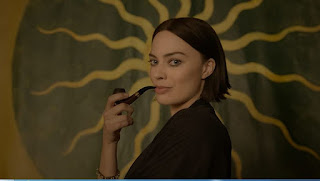To Leslie is played to riveting perfection by Andrea Riseborough, who delivers a performance that’s extraordinary in its sparks of hope and slow-dawning self-awareness amid the despair, dissembling and self-delusion. To Leslie is a movie about hitting bottom but also a story steeped in grace — and even, within its understated, lived-in aesthetic, tinged with a bit of fairy tale, Prince Charming arriving in the form of a low-key and affecting Marc Maron's Sweeny. Maron is a guileless but wise guardian angel, watching Leslie flail and lie and struggle, and keeping close while she suffers through cold-turkey withdrawal from alcohol. It’s a role full of opportunities to chew scenery and crumble melodramatically, but she never sounds a false note. Morris gives us a long, unbroken scene of Leslie just sitting at a bar and listening to a sad country song, and you can’t take your eyes off her. There are not many actors who can hold your attention, much less interest, doing that. Riseborough digs deep and takes no shortcuts in tracing a hard-won path to redemption, the rage that holds Leslie back transformed into the energy that fuels her survival.
In one of the strangest developments of the season, the Oscar voting period saw almost every A-lister in Hollywood log onto Twitter to heap praise on Andrea Riseborough’s performance in To Leslie, “a small film with a giant heart.” The movie, a low-budget sobriety drama that debuted at SXSW, hadn’t technically come out of nowhere: Riseborough did get an Independent Spirit Award nom, and the film was on the National Board of Review’s list of best independent movies of the year. Still, To Leslie made barely a peep when it was released in October and had been ignored by all the major precursors, leading most pundits to believe the Twitter blitz would be too little, too late. It turns out professional actors had a better sense of awards-worthy acting than those of us who sit behind a laptop. Riseborough’s rise brought the best-actress hopes of two other contenders to an abrupt end: “The Woman King” star Viola Davis and “Till” actress Danielle Deadwyler were both shut out of a best actress category that many pundits assumed would be mostly made up of women of color. Davis had cruised through the season so far, earning nominations from the Globes, Screen Actors Guild, Critics Choice Awards and BAFTA. Only Tuesday did the Oscar-winning actress fall short. The Whale is a ghastly, quite cynical film. The Whale missing out in Adapted Screenplay is a sign that many in the Academy felt the same way. It’s also a sign that Brendan Fraser’s hold on the trophy is far from secure.
Although the main duel will probably be between Cate Blanchett and Michelle Yeoh, it's Andrea Riseborough and Ana de Armas who offer the closer to a gritty naturalistic performance and, in the case of De Armas, stylish glamour. Riseborough is most known for her role in Brandon Cronenberg's chilly sci-fi Possessor and David O' Russell's overlooked Amsterdam. In his review for The New Yorker, Richard Brody considered Amsterdam one of the best films of 2022:
"Amsterdam is a historical fantasy that is written and acted like a comedic tall tale, but it’s all the more remarkable for its solid basis in reality. It also takes its place in a recent, odd but significant subgenre of movies that has cropped up in response to the authoritarian and hate-filled deeds and rhetoric of the Trump era: resistance cinema. It would be easy to mock the very notion as a form of highly selective crowd-pleasing, were many of these movies, including “Amsterdam,” not among the most emotionally committed and aesthetically distinctive films of our times. The movie is full of felicities that manage to be, at the same time, poignantly earnest and giddily inventive, as when Burt (Christian Bale), heading off to perform the autopsy while bearing a bouquet for the estranged Beatrice (Andrea Riseborough) flees the police and reaches a safe hiding place while still grasping the flowers; or when Burt, resetting Irma’s broken wrist, gives rise to the film’s most breathtakingly rapturous moment.
The frequent literary archness of the dialogue yields an incantatory set of smart poetic refrains. Margot Robbie delivers her best performance to date, incarnating Valerie with a lighthearted lilt and a distinctively dancelike element of deft physical comedy that belies the sacrifices demanded by her creative fervor, romantic passion, and drive for independence. Bale delivers a strange, recklessly great performance—with a hectic intensity it’s a comedic performance by a non-comedian that centers and suffuses the film with his wildly charismatic presence. “Amsterdam” is a drama of a country and a world shaken to their very foundations by the incurable traumas of war.
O' Russell sees a link between white supremacy and misogyny, and indicts the arrogant avarice of American business leaders as cavalierly indifferent to democracy, wantonly selling out the country's institutions and freedoms to the interests of foreign tyrants, whose practices and policies they seek to install here. He shows the untroubled ease with which willful, corrupt, and self-interested media ideologues intentionally and uninhibitedly pollute the civic environment at large and bend the minds of the vulnerable masses, whose social burdens and political frustrations are the results of policies and leaders promoted by the selfsame media. He recognizes the contempt for art, the hostility to culture, as a fundamental marker of this nexus of hatred and oppression. Above all, he sees a country sickened by its own cruelty, feeding on itself, proving its own monstrosity by imposing on private lives and obliterating the fundamental virtue and value of romantic love. May Amsterdam’s melodramatic sentimentality be forgiven; not many films of such exuberance, since the time of Chaplin, have been fuelled by such rage. Source: newyorker.com



















No comments :
Post a Comment